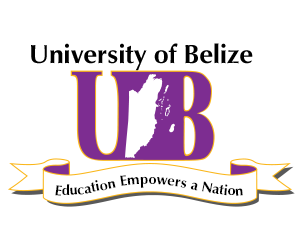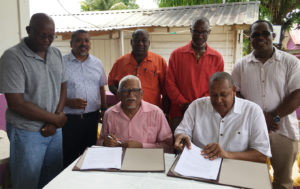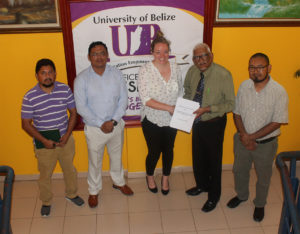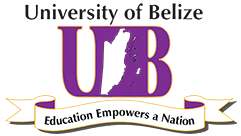- Version
- Download 363
- File Size 2.15 MB
- File Count 1
- Create Date June 13, 2019
- Last Updated June 13, 2019
UB Imprint Vol 53: Internationalizing Marine Research and Outreach
The University of Belize (UB), the country’s national university, recently signed two Memoranda of Understanding (MoU) with the National Oceanography Center (NOC) in the United Kingdom and with Save-Mar, a fully, privately owned Belizean firm, to internationalize its marine research efforts.
According to UB’s President, Professor Emeritus Clement Sankat, “the aim of these partnerships is to give our Faculty, Staff and Facilities opportunities for international exposure while building efficiency in what we do as an institution devoted to Teaching, Research and Outreach.”
Private-Public Partnerships (PPP) have become an increasingly common strategy for countries all over the world to meet their development goals. In the educational sector, partnerships between industries and universities have proven critical drivers of the innovation economy. These relationships have created streams of external funding, enhanced opportunities for research, sources for required human capital and ideas for industry; vital inputs to keep teaching and learning current and have contributed to solutions for pressing developmental challenges.
“We don’t exist alone in the ecosystem; and the private sector has been at the heart of innovative and impactful development across the world; so as the national university, we must build bridges to the private sector and to civil society.… these partnerships must be celebrated, increased and expanded if we are to thrive within this rapidly changing and technological environment,” said Professor Sankat.
The MoU with the National Oceanography Center (NOC) of the United Kingdom, signed on May 30th, will develop joint training, research projects and technical programs that enables knowledge transfer and research collaboration focused on marine science. According to Professor Sankat, “As the national university, this partnership will enable the UB to build its marine research capacity and will assist in providing a supportive learning environment such as laboratories and technology transfer, including training for students, faculty and staff.”
Complementing this partnership with NOC, UB partnered with Save-Mar, to facilitate the University in managing its Marine Science Research Facility on Hunting Caye. In this capacity, Save-Mar will develop UB’s outreach facility into a first-class marine research station, where UB students, faculty, local and international researchers will gain practical, hands-on training for sustainable marine practices and management; an intimate understanding of the natural marine processes that support our fishers and our economy and propel regional conservation efforts and sustainable use of our natural resources.
The University of Belize recognizes the crucial role of marine science in delivering improved outcomes in terms of the sustainable use of clean energy, minerals and other resources, protecting people and property from natural disasters, wealth creation, environmental protection and sustainability, and enhancing the quality of life for the people of the country.
Therefore, when it ventured into these partnerships, it did so for three primary reasons. The first to increase the total resource base for the University. These partnerships will assist the University in meeting its wide resource gaps and in bringing about internal and external resource-use efficiency, improvement in quality service delivery and promotion of research and academic excellence. Secondly, it will allow UB to promptly respond to changing market signals in academic and other aspects of its operations because of its ability to embrace market-based efficient solutions to make the University commercially viable. This would essentially enable UB to better achieve its teaching, research and services objectives to not only meet the country’s development needs, but also it will allow the University, in its offerings, to remain current, efficient, transparent and engaging. As such, UB will benefit from research and outreach that innovatively addresses Belize’s development needs for resilient communities and thriving economies especially those that depend on the marine environment.
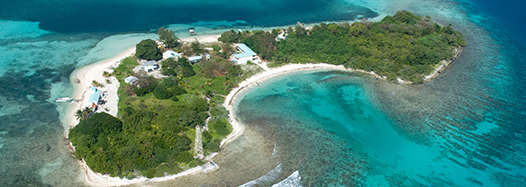 Finally, these two partnerships will enhance the internationalization of the University. Having a regional marine research station will strengthen linkages between UB and other universities, regionally and internationally and will be the hub for enhancing marine literacy in the region. More importantly, it will enable the University to build on its intellectual stature as a repository for the country’s knowledge so as to improve policymaking that treats with not only Belize’s natural resources, especially our natural environment, but also in the long term can contribute to discoveries and solutions critical to regional and international marine conservation and sustainable development.
Finally, these two partnerships will enhance the internationalization of the University. Having a regional marine research station will strengthen linkages between UB and other universities, regionally and internationally and will be the hub for enhancing marine literacy in the region. More importantly, it will enable the University to build on its intellectual stature as a repository for the country’s knowledge so as to improve policymaking that treats with not only Belize’s natural resources, especially our natural environment, but also in the long term can contribute to discoveries and solutions critical to regional and international marine conservation and sustainable development.




